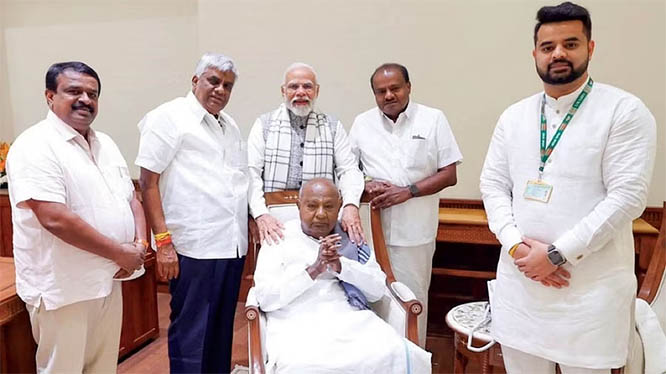Alappad, Jan 11: Abandoned homes, deserted school, heaps of sand, a lone temple and dried up mangroves.
These are the remnants of a once green Ponmana village under the coastal Alappad panchayat in Kollam district in southern Kerala where locals are up in arms against beach sand mining, blaming it for sea erosion eating up their lands.
They claim hamlet after hamlet was 'disappearing' from the map due to mining activities by the Indian Rare Earth (IRE), a central Public Sector Undertaking, and state government-owned Kerala Minerals and Metals Limited (KMML).
Seeking to save their remaining villages, the people of Alappad and nearby hamlets under the banner of Anti-mining People's Protest Council have been on a relay-hunger strike at Vellanathuruthu near here for the past over two months demanding a complete halt to the mining activities.
However, an official of the IRE, when contacted, said the company was following all mining norms.
The two firms together have been engaged in mineral sand mining along the beach off the Kollam coast since the 1960s.
This PTI correspondent saw deserted houses, roads and dried up mangroves in Ponmana village with the protesters claiming this was the scene in several other hamlets too.
In Ponmana, only two families remain, a resident said.
According to the protesters, a lithographic map decades ago had shown the area of Alappad panchayat as 89.5 square kilometre and it has now shrunk to a measly 7.6 square km due to sea erosion caused by the mining.
Alappad is a narrow stretch between Trivandrum-Shoranur (TS) Canal and the Arabian Sea that was commissioned between the 18th and 19th century.
Agitators allege that if this strip of land erodes any further, the backwaters would irreversibly merge with the sea and turn the river waters saline.
This in turn would damage paddy fields of upper Kuttanad, which is below the sea level and known as the rice bowl of Kerala.
"Since ours being a public sector company with strategic importance, there are several monitoring agencies and both the state and the central governments are aware about processes followed by us," the IRE official, who did not want to be named, said.
Around 60 industries of strategic importance, including the Travancore Titanium Products and the KMML, were making use of their services, he added.
Kollam District collector Dr S Karthikeyan said the government was fully aware of the situation. "We will study whether the apprehensions are correct. Then we will take a look at sustainable mining limit."
The district administration had conducted multiple hearings and the government had already given certain suggestions like concentrating on inland mining and reducing sea mining, he said.
"In case of sea mining, they should make groynes. The company is also changing their plans accordingly. They are going to do deep mining," he added.
A groyne is a rigid hydraulic structure built from an ocean shore or from a bank that interrupts water flow and limits the movement of sediment.
K S Sreekumar, a member of the protest council, said nearby villages including Onattukara, Upper Kuttanad and Arattupuzha in Alappuzha district were next in line.
"The agitation is not only for ourselves," he said.
Prasanth (38) left his job in the UAE and returned to his village years ago after the company assured him a job in exchange for land that it could mine.
"The job we got was under a contract that expired after two years. Most villagers have left the area with whatever they got as compensation from the company," he said.
Rohini, an interior designer who is an active member of the protest council, said the residents don't want to leave the place where they grew up.
"The government has assured us a compensation Rs 10 lakh if we give our land for mining. But we cannot leave as this the place we grew up. This is where our culture is, where our job is. We want our children to grow up here.... We want the mining to stop completely," she said.
Sreekumar said if the mining continued, salt water will enter the Pallickal and Achankovil rivers towards the east and ultimately the paddy fields of central Travancore.
"We are trying our level best to project our issue above all other brouhaha, including the one over Sabarimala... We have a larger issue here. We are facing eviction from the land where we spent have spent our lives", he said.
People from various walks of life were participating in the agitation, he said adding no political party had so far pledged support to their cause.
Besides the protest, a social media campaign was also on against mining in the area.
However, a local resident, speaking on condition of anonymity, alleged the campaign was being promoted by private players who wanted to end the government monopoly over mining in the area and take over the task themselves.
Freshwater ecology expert Dr Jayalekshmy V told PTI that the 'uncontrolled' sand mining in Cheriyazheekkal-Alappad area was affecting the ecological stability of Ashtamudi Lake and other associated freshwater fluvial ecosystems.
"Non-sustainable extraction of beach sand has led to the destruction of sand banks and widening of the Pallickal river mouth and during summer when the water content is low, it will lead to the influx of marine water into the river," she said.
This "unusual intrusion" of marine water would alter the natural niches of aquatic organisms, leading to ecological stress related with biological activities like exchange of respiratory gases, fertility and survival of young ones.







Comments
Add new comment